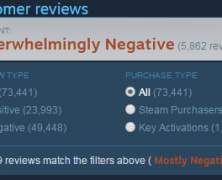Back in the day, video game preorders were hugely beneficial. We didn’t have digital distribution – at least not on the scale we’ve come to love and hate. A preorder meant you went to your local EB Games, Gamestop, Future Shop or $preferred_local_retailer, they’d reserve a copy of the physical copy of the game for you so you’d be guaranteed to play it as soon as possible. I have fond memories of going to the mall at midnight to pick up highly anticipated titles like Halo 3 and then skipping class the next day because I stayed up all night playing (yeah, I was that kind of student). I’d get to meet all kinds of fans and members of the local gaming community while waiting in line, and in some ways it validated my decision: I wasn’t the only one crazy enough to do something like that. Event organizers would hand out flyers to their upcoming tournaments and gatherings, and everyone was nice and chummy. Ah, nostalgia. Since then, we’ve gotten our hands on better internet connections and more reliable digital distribution mediums like Steam, Origin, Battle.net, gog.com and plenty more. Along with this convenience came the advent of day-one patches, locked DLC being included in the main game’s files and all forms of DRM butchery consumers despise. This really started to ramp up around 2008-2009. Right around the same time, game developers saw the console market start to explode thanks to smash hit titles like Call of Duty 4: Modern Warfare, the aforementioned Halo 3, Gears of War, Assassin’s Creed and a wide variety of other franchises that pushed out yearly installments. PC gamers repeatedly got the short end of the stick. On the few-and-far-between occasions that a developer chose to publish their game...

